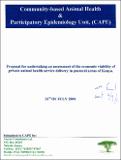| dc.description.abstract | Acacia Consultants Ltd. has the pleasure of submitting this proposal for consideration by CAPE for the assessment of the economic viability of private animal health service delivery in pastoral areas of Kenya. One of Acacia's strengths is in its considerable experience and work in pastoral and agro-pastoral areas in the Greater Horn of Africa region and in community-based animal health care delivery systems in particular. As early as the mid-80s, consultants now working for Acacia, were already involved in decentralized animal health service provision in Turkana district, under the EU-funded Turkana Rehabilitation Project. At the time, community-based animal health workers were called bare-foot veterinarians or "Paravets". Much more recently i.e. in the mid-90s until now, Acacia Consultants have been involved in establishing community-based animal health systems based on different models as proposed by community members and other stakeholders. Acacia has also undertaken evaluations on animal health projects funded by DFID in Kenya and others funded by other agencies in Angola, Sudan and Somalia. Where Acacia was involved in supporting implementation of projects in the five northern districts of Kenya, (covered by the Acacia-DPIRP programme), results have been mixed because of various reasons. These reasons include: lack of economic feasibility studies and analysis, differences in models and approaches, differences in cultural and community-related factors, external factors such as insecurity and drought, poor NGO involvement in Animal Health resulting in the undermining of private sector initiatives, legislation problems, lack of support from local government-led veterinary offices. One of the greatest lessons learnt from these interventions has been that of the need to assess the economic viability of the different models and approaches currently being applied in the implementation of decentralized animal health services. | |
